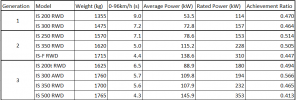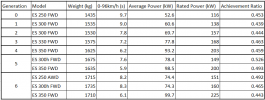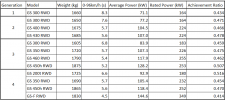A concept that is rarely talked about in western car media but is talked about increasingly frequently in Chinese car media is "achievement ratio". It measures how fast a car accelerates compared to its theoretical power-to-weight ratio.
The theory is very simple physics: F = ma, where F is force, m is mass and a is acceleration. Also P = Fv, where P is power, F is force and v is speed. Therefore, acceleration is a function of power-to-weight ratio (P/m) given the same speed. In reality, this "power" is not equal to the rated maximum power of the car, since there are mechanical frictions, traction limitations and powertrain calibration that all contribute to losses. But most importantly, ICEs don't make peak power at all rpms and there is no ideal CVT. The ratio of this 'real power used for acceleration' to maximum rated power is the achievement ratio.
In short, the higher the achievement ratio, the more power is used to accelerate the vehicle and not lost in the drivetrain and wheelspin, and the side benefit is better fuel economy. Example of high achievement ratio cars are BEVs, PHEVs and notably ICEVs made by BMW. Example of low achievement ratio cars are American muscle cars that usually rely on brute force.
There is no general consensus on how achievement ratio is defined since it's a very complicated measurement. The most basic form is just dyno-tested horsepower divided by maximum rated power. The value is 0.75-0.9 depending on the driveline (FWD/RWD/AWD) and dyno setup (axle vs. wheel). But this is still an overestimate since it is a static scenario while real world acceleration is a dynamic scenario with more sources for losses. For my calculations, I used a slightly more complicated formula using kinetic energy of the car travelling at 60mph/96kph as the basis to calculate 'average acceleration power'. Here is a table of achievement ratios of all new Lexus products with available data, compared to similar BMW vehicles which are known to have the best achievement ratios among ICEVs.

Conclusions:
>> AWD cars generally have higher achievement ratios despite higher drivetrain losses. This is because they have less wheelspin, so less energy is wasted on creating molten rubber.
>> Lexus ICEVs usually underachieve compared to their power-to-weight ratio. This is a result of very conservative engine mapping, transmission shift strategies, traction control and just general lack of optimization. A negative consequence is Lexus ICEVs usually have worse fuel economy than competitors.
>> The LS 500 is a notable over-achiever. Despite often being called out for overestimated performance, the LS 500 is actually reasonably fast for how heavy it is. The poor real performance of this car is mostly due to the weight. If it could achieve the advertised 4.6s 0-96kph time, it would have higher achievement ratio than most BMWs but unfortunately Lexus is misleading its customers here.
>> The 10-speed also gives the LC 500 a better achievement ratio than the 8-speed RC-F and IS500 FSP. The RC-F could be faster if it had the 10-speed with a transmission cooler.
>> The old 6-speed used on the GX and IS300 is surprisingly good. I think we all remember how the 8-speed Gen.3 IS 350 was a downgrade compared to the original 6-speed Gen.2 IS 350.
>> As expected, most of their hybrids have very high achievement ratios thanks to the instant torque from electric motors and high efficiency. The multi-stage hybrid system is particularly quick considering how little power it has and how heavy GA-L products are.
>> I think it's pretty clear where Lexus put their emphasis on. They spend most of their effort on making their hybrids as efficient as possible, while ICEVs are mostly an after-thought and they are content with them being acceptable.
>> The highest achievement ratio I've ever seen in any car so far is the bZ4X AWD with 0.691. That's over 40% more efficient than most Lexus ICEVs. A hypothetical "IS EV AWD" at ~2100kg with ~300kW/400hp can do 0-60mph in 3.6s even if they make zero efficiency improvements by 2025. That's why I am quite excited about the real world performance of their future BEVs.

The theory is very simple physics: F = ma, where F is force, m is mass and a is acceleration. Also P = Fv, where P is power, F is force and v is speed. Therefore, acceleration is a function of power-to-weight ratio (P/m) given the same speed. In reality, this "power" is not equal to the rated maximum power of the car, since there are mechanical frictions, traction limitations and powertrain calibration that all contribute to losses. But most importantly, ICEs don't make peak power at all rpms and there is no ideal CVT. The ratio of this 'real power used for acceleration' to maximum rated power is the achievement ratio.
In short, the higher the achievement ratio, the more power is used to accelerate the vehicle and not lost in the drivetrain and wheelspin, and the side benefit is better fuel economy. Example of high achievement ratio cars are BEVs, PHEVs and notably ICEVs made by BMW. Example of low achievement ratio cars are American muscle cars that usually rely on brute force.
There is no general consensus on how achievement ratio is defined since it's a very complicated measurement. The most basic form is just dyno-tested horsepower divided by maximum rated power. The value is 0.75-0.9 depending on the driveline (FWD/RWD/AWD) and dyno setup (axle vs. wheel). But this is still an overestimate since it is a static scenario while real world acceleration is a dynamic scenario with more sources for losses. For my calculations, I used a slightly more complicated formula using kinetic energy of the car travelling at 60mph/96kph as the basis to calculate 'average acceleration power'. Here is a table of achievement ratios of all new Lexus products with available data, compared to similar BMW vehicles which are known to have the best achievement ratios among ICEVs.

Conclusions:
>> AWD cars generally have higher achievement ratios despite higher drivetrain losses. This is because they have less wheelspin, so less energy is wasted on creating molten rubber.
>> Lexus ICEVs usually underachieve compared to their power-to-weight ratio. This is a result of very conservative engine mapping, transmission shift strategies, traction control and just general lack of optimization. A negative consequence is Lexus ICEVs usually have worse fuel economy than competitors.
>> The LS 500 is a notable over-achiever. Despite often being called out for overestimated performance, the LS 500 is actually reasonably fast for how heavy it is. The poor real performance of this car is mostly due to the weight. If it could achieve the advertised 4.6s 0-96kph time, it would have higher achievement ratio than most BMWs but unfortunately Lexus is misleading its customers here.
>> The 10-speed also gives the LC 500 a better achievement ratio than the 8-speed RC-F and IS500 FSP. The RC-F could be faster if it had the 10-speed with a transmission cooler.
>> The old 6-speed used on the GX and IS300 is surprisingly good. I think we all remember how the 8-speed Gen.3 IS 350 was a downgrade compared to the original 6-speed Gen.2 IS 350.
>> As expected, most of their hybrids have very high achievement ratios thanks to the instant torque from electric motors and high efficiency. The multi-stage hybrid system is particularly quick considering how little power it has and how heavy GA-L products are.
>> I think it's pretty clear where Lexus put their emphasis on. They spend most of their effort on making their hybrids as efficient as possible, while ICEVs are mostly an after-thought and they are content with them being acceptable.
>> The highest achievement ratio I've ever seen in any car so far is the bZ4X AWD with 0.691. That's over 40% more efficient than most Lexus ICEVs. A hypothetical "IS EV AWD" at ~2100kg with ~300kW/400hp can do 0-60mph in 3.6s even if they make zero efficiency improvements by 2025. That's why I am quite excited about the real world performance of their future BEVs.

Last edited:






